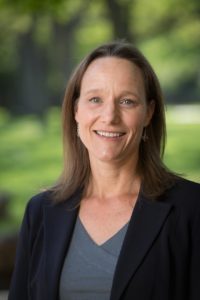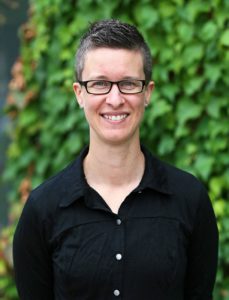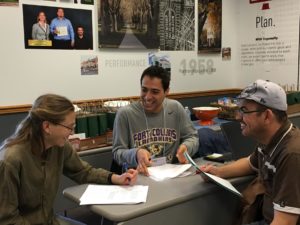Kristina Quynn radiates positivity, especially when discussing CSU Writes, a program that facilitates scholarly writing productivity for faculty and graduate students.
Quynn, founding director of CSU Writes, put together a grant proposal several years ago hoping to organize a writing group program, which then grew when she thought writing group members might also benefit from workshops, writing retreats, drop-in writing sessions and guest speakers. Quynn used programs at Duke, Stanford, UNC-Chapel Hill and others as models and then built on it from there. Its range of offerings are diverse, just as scholarly writers’ needs are diverse.

CSU Writes started in fall 2015 with a grant from the Ripple Effect, which is now The Women and Gender Collaborative.
“I originally thought we would work with about 20 to 50 writers,” said Quynn. “We ended up working with 277 writers and realized how great the interest was in a program like this.”
Graduate School support
The Graduate School was instrumental in getting the program established, through both funding and advocacy.
“The Graduate School identified Kristina as a potential partner when we noticed that she was providing graduate student writing retreats a few years ago,” said Dean Jodie Hanzlik. “After hiring her to present these programs on behalf of the Graduate School, we were so impressed with her skills, philosophy, passion and certainly the outcomes of the students who attended her programs.”
So the Graduate School invited her to serve as an important aspect of its ongoing professional development initiative. Since then, the Graduate School has partnered with the offices of the Provost and the Vice President of Research to support CSU Writes and to expand her offerings across campus to graduate students, faculty and faculty involved in research initiatives sponsored through the OVPR.
“CSU Writes is a gift to all those who write professionally,” Hanzlik said. “Kristina’s programs provide strategies to become more fluent, effective and happier writers, for those who are starting out as well as those who have been writing for years.”
Recent growth
In 2016-17, CSU Writes grew to include approximately 540 participants who come from all eight colleges.
This academic year, Quynn anticipates a similar increase in participation with the additions of individualized productivity packages for faculty and peer-editing options for grant writers. Quynn continues to design retreats and discussion/work session support from The Women and Gender Collaborative. Mondays First, one of these offerings, sets aside a place for women faculty to gather, talk about their work, and then write together on the first Monday of each month.
Molly Gutilla, an assistant professor in the Colorado School of Public Health, was struggling to overcome the barrier of starting her dissertation. Gutilla tried almost everything to gain momentum on her writing project – from a dissertation coach to a change in life scheduling – but couldn’t find anything that helped. Then last spring, Sheryl Magzamen, an assistant professor in the Department of Environmental and Radiological Health Sciences, recommended CSU Writes to Gutilla.

“CSU Writes was the catalyst to getting it done,” said Gutilla. “I went to workshops, I got assigned a writing partner and I went to the ‘show up & write’ sessions.”
The “show up & write” sessions, which are about two hours long, are proctored by about 10 volunteers and are an opportunity for writers to drop in, write, and then go on with their day. They even have punch cards, and after 20 sessions, participants earn a mug.
“That little punch card became symbolic of my commitment to my writing,” said Gutilla. “The mug is great, but it was also a symbol for putting in the hours, and for me, that was the only way to get through it and commit to making regular progress.”
CSU Writes offerings
The program serves a three-pronged audience: graduate students, faculty and faculty involved in research initiatives sponsored through the OVPR. It is divided into two separate tracks, Faculty Writes and Grad Writes and is open to postdocs. CSU Writes offerings are rooted in research on healthy writing practices for increased writing productivity.
According to Quynn, participating in a community-based writing program like this offers multiple avenues for faculty to gather with faculty from other departments, or graduate students with other graduate students, in ways that foster innovation and creative problem-solving.
The CSU Writes intern, Lexi Gehring, a doctoral candidate in Biochemistry, has helped track participation numbers, and she runs the faculty productivity packages — a weekly accountability email check-in. Gehring attended the very first CSU Writes workshop in 2015 and will graduate this fall. She says she appreciates the delicate balance of writing community, writing support and writing confidentiality the program provides.

“Shamelessly borrowing” a phrase from Joli Jensen, guest speaker and author of Write No Matter What, Quynn likes to remind scholarly writers to have “brief, frequent, low-stress and highly rewarding encounters with a project they enjoy.”
The workshop and retreats build on Jensen’s sentiment and focus on the key areas faculty and graduate student writers struggle with most: space, time, momentum and style. Some of the more popular workshops have been on “Writing for Speed,” “Why Academic Writing Stinks” and “Scheduling Your Semester Writing.” Future workshops will include the topics “Ways to Build Momentum” and “Stress-Free Writing.”
“My hope with CSU Writes is that it helps us write in healthier and happier ways,” says Quynn, “or even better, to fall in love with writing since writing is the way we build successful careers and get our ideas out to our scholarly communities and the public.”
That sentiment is reflected in the program’s new tagline, which encourages faculty and graduate students to “write early. often. better. together.”
CSU Writes’ current offerings and events can be found at http://csuwrites.colostate.edu
2017-18 Schedule of Events
Fall 2017
September
1-3: GRAD Writes Weekend Writing Retreat
5: FACULTY Writes Workshop on Schedule Your Semester: Clockwork Muse
6: GRAD Writes Workshop on Schedule Your Semester: Clockwork
15-16: FACULTY Writes 1-½-Day Writing Retreat
11: Mondays First, Women Faculty Writing Session & Conversation (8 a.m. to 11 a.m.)
Sponsored by Women & Gender Collaborative with Presenter Cori Wong
12: FACULTY Writes Writing Group-Up
13: GRAD Writes Writing Group-Up
October
2: Mondays First, Women Faculty Writing Session & Conversation (9 a.m. to 11 a.m.,) Sponsored by WGC
10: GRAD Writes Workshop Establishing a Writing Practice: Ways to Build
Momentum
11: FACULTY Writes Workshop Establishing a Writing Practice: Ways to Build
Momentum
20-22: GRAD Writes Weekend Writing Retreat (Fri, 3 p.m. to 5 p.m. & Sat/Sun 8:30 a.m. to 4:30 p.m.)
25: GRAD Writes Strategies to Improve Writing in English
Guest Presenter: Sarah Kalert
November
6: Mondays First, Women Faculty Writing Session & Conversation (9 a.m. to 11 a.m.)
8: GRAD Writes More Strategies to Improve Writing in English
Guest Presenter: Sarah Kalert
December
4: Mondays First, Women Faculty Writing Session & Conversation (9 a.m. to 11 a.m.) Sponsored by Women and Gender Collaborative